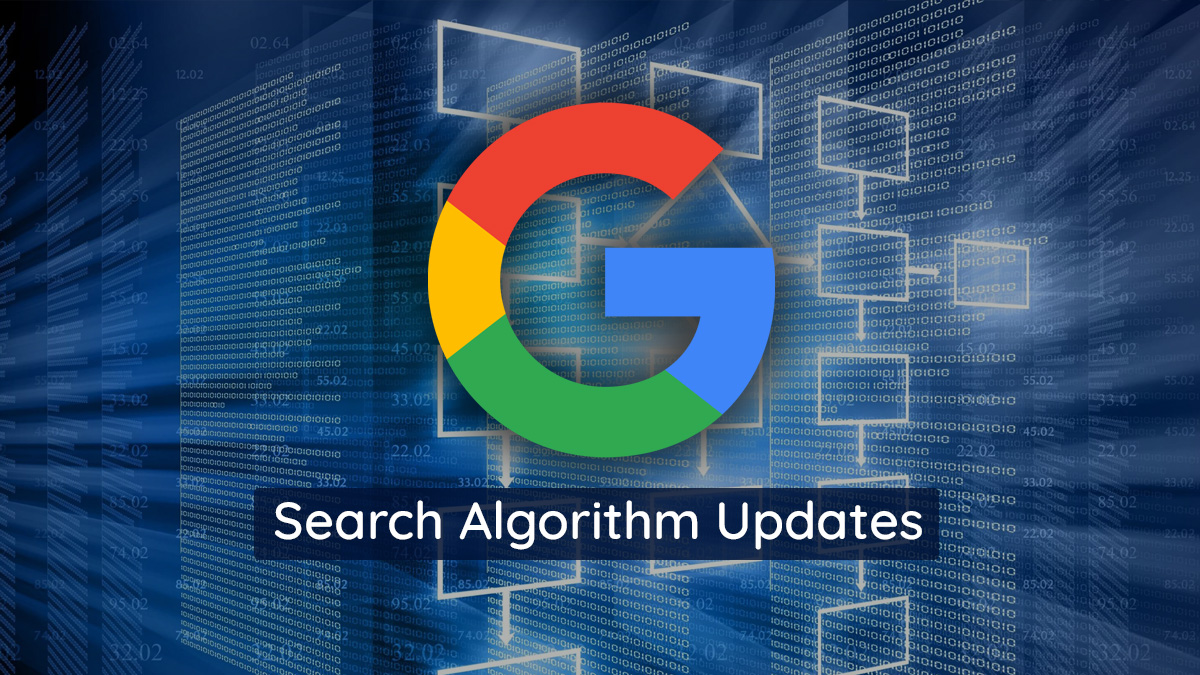Google consistently refines its search algorithms in response to changing technology and consumer behaviors. Staying current with these updates is crucial for marketers and business owners to remain visible online. The November 2023 Core Update is a significant recent change, focusing on combating spam across languages and targeting deceptive practices. Following the October Core Update, which caused instability, this emphasizes quality in content, particularly against AI-generated and unhelpful material. Google’s dedication to enhancing search result relevance is evident, impacting websites swiftly. Understanding these updates is essential for website owners and digital marketers to maintain visibility in Search Engine Results Pages (SERPs).
Here we cover the ten most important Google Search algorithm updates for 2023 in chronological order.
These include:
- Link Spam Update (December 2022 – January 2023)
- Product Reviews Update (February 2023)
- Core Update (March 2023)
- Review Update (April 2023)
- Core Update (August 2023)
- Helpful Content Update (September 2023)
- Core Update (October 2023)
- Spam Update (October 2023)
- Core Update (November 2023)
- Review Update (November 2023)
As the new year approaches, it’s essential to review the significant updates Google implemented in 2023. To assist in navigating these changes, we’ve compiled an infographic summarizing Google’s 2023 updates. This resource aims to provide a comprehensive overview of the latest guidelines and modifications, offering valuable insights for shaping your strategy in 2024. Stay informed and leverage these insights to optimize your content and maintain visibility in the evolving landscape of Google and SEO.

Top 10 Google Search Algorithm Updates in 2023
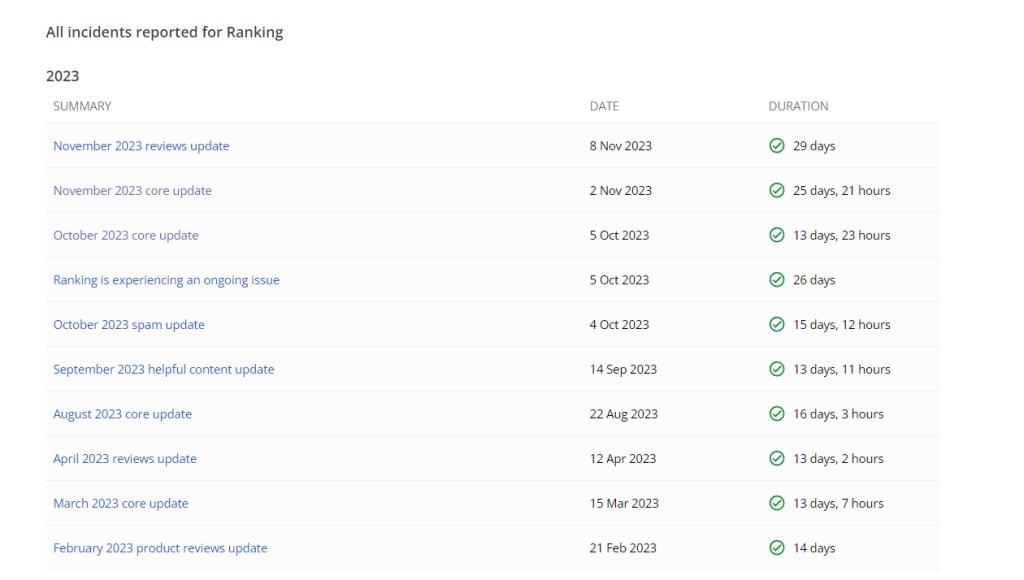
A list of Google algorithm updates that have occurred in 2023 thus far.
In 2023, Google’s algorithm updates have been dynamic, presenting challenges for websites not prepared for these changes. MozCast, a tool that monitors day-to-day fluctuations in search rankings, serves as a useful barometer for these shifts.
Typically, MozCast shows a ‘temperature’ around 70°F on an average day. A notable event occurred on March 15th, when Google rolled out a Core Update over 13 days. During this period, MozCast temperatures soared to 108.7°F, exceeding 100°F for six consecutive days. To navigate these changes successfully, it’s crucial for website owners to stay vigilant and adapt promptly.
Link Spam Update (December 2022 – January 2023)
Google initiated the Link Spam Update in December 2022, targeting link spam that was distorting search results. The update employed SpamBrain, Google’s AI, to identify and neutralize artificial links adversely affecting search rankings. This measure aimed to reduce the impact of low-quality or irrelevant links on a site’s ranking.
The update lasted approximately a month, starting on December 14, 2022, and concluding with its official release on January 12, 2023. Google’s focus was on enhancing search result quality by emphasizing the importance of authentic and meaningful content.
It’s important to note that the Link Spam Update is just one of several algorithmic enhancements implemented by Google in 2022. This highlights a key lesson for website owners: the importance of generating high-quality content and building genuine connections should be prioritized over creating artificial link profiles.
Also Read: Top SEO Trends of 2023 to Follow for Higher Rankings
Product Reviews Update (February 2023)
From February 21 to March 18, 2023, Google deployed the Product Reviews Update. This global update affected product reviews in multiple languages, including English, Spanish, German, French, Italian, Vietnamese, Indonesian, Russian, Dutch, Portuguese, and Polish. The focus extended beyond the review text itself, encompassing an evaluation of the entire review page’s quality.
Businesses were urged to improve the quality of their product reviews by adding valuable and insightful information during this update. This approach not only aligned with Google’s update but also contributed to an enhanced user experience.
The observed volatility underscores the heightened importance of the recent update in product reviews compared to its predecessors, as indicated by data from specific sources. Furthermore, this update is particularly noteworthy as it marks the conclusive iteration dedicated to product reviews before undergoing a transformation into the more comprehensive reviews update.
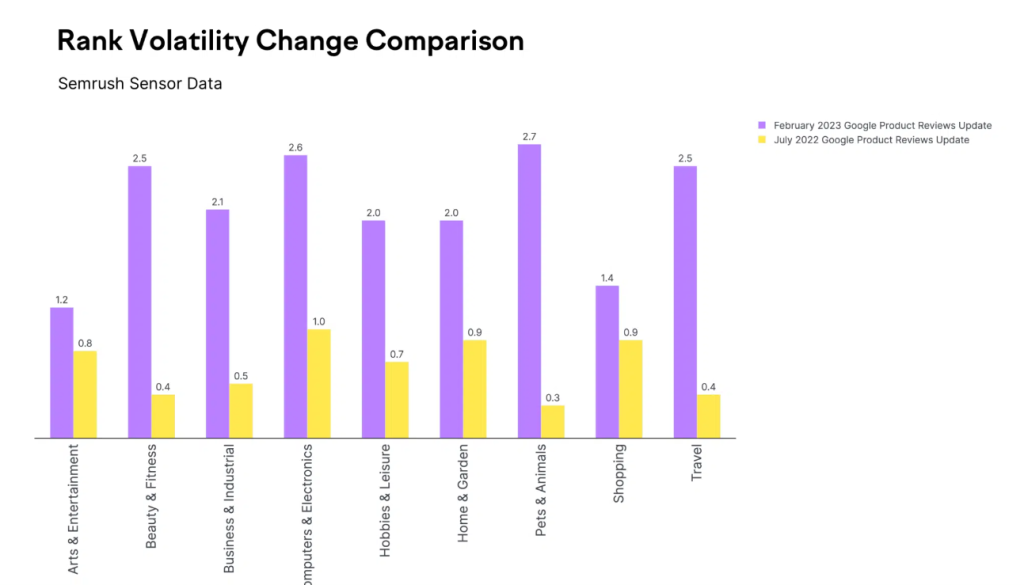
E-commerce websites, for optimal performance, were recommended to implement optimization strategies. This involved the precise use of product structured data and schema markup. By adopting these improvements, businesses could better navigate the changing digital environment and meet both user expectations and search algorithm requirements.
Core Update (March 2023)
The March 2023 Core Update commenced on March 15, 2023. This significant algorithm update influences content across various geographies and languages. Google introduced these modifications to refine the evaluation of information within its systems.
Practically, pages that may have been undervalued previously could now see higher rankings in search results. It is important to note that this update does not specifically target individual pages or websites.
For website owners, the emphasis should be on creating high-quality websites. This includes producing superior content, offering an excellent user experience, and demonstrating strong E-E-A-T signals (experience, expertise, authority, and trustworthiness). Adapting effectively to the March 2023 Broad Core Update is essential for achieving significant impact and value in this area.
The volatility in this latest update has held steady in line with previous core updates, as suggested by data from some providers.
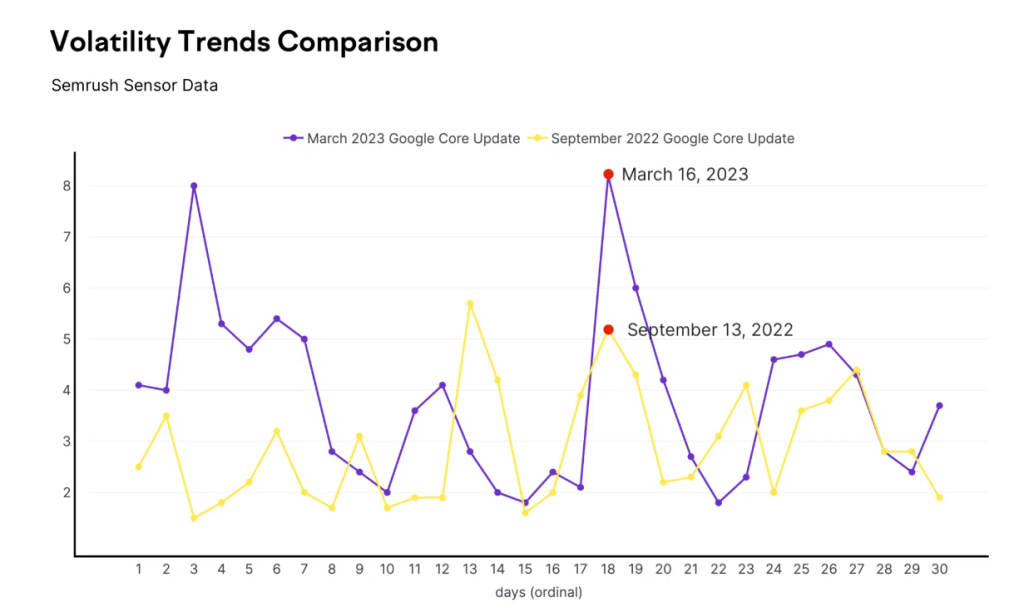
Review Update (April 2023)
The April 2023 Review Update, launched on April 12, 2023, marks a significant shift in Google’s algorithm, focusing on the evaluation of products, services, places, games, movies, and related topics. This update is crucial not only for SEO specialists but also for companies that rely heavily on consumer reviews. SEMRush Sensor noted considerable volatility in search rankings on April 20th, 23rd, and 25th during its rollout.
The goal of this update is to improve the user experience and search rankings by providing more accessible and relevant information from product and service reviews.
In line with this algorithmic shift, Google emphasizes the importance of adhering to its standards for creating high-quality reviews. Your content should showcase expertise, back up claims with evidence, and thoroughly explore both the benefits and drawbacks of the subject. The primary aim is to aid consumers in making informed decisions.
To align with these objectives, it’s advisable to employ best practices such as viewing the subject from the user’s perspective, drawing comparisons with similar products or services, and including links to relevant resources. These practices will help create a more comprehensive and informative review.
The observed volatility in the recent update had a broader scope compared to previous ones. This was primarily due to its impact extending across a wider range of review content categories.
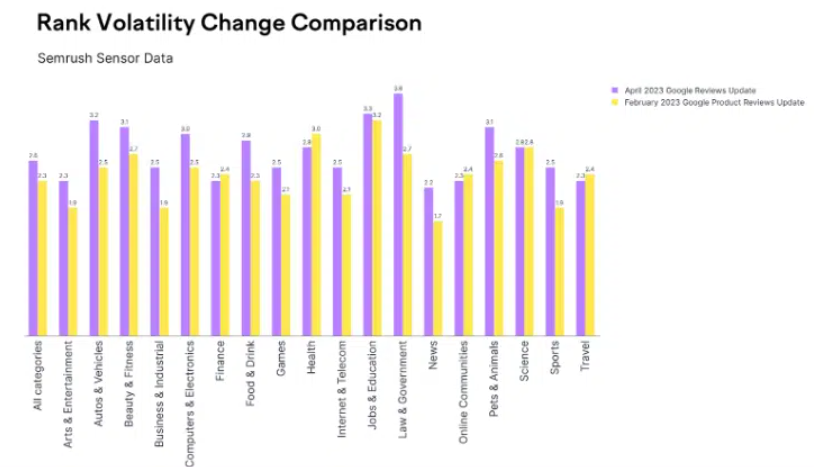
Also Read: How to Run a Successful SEO Campaign in 2023?
Core Update (August 2023)
On September 7, Google rolled out its second major core update of the year, the August 2023 Core Update, aiming to enhance search results. This update affects all types of content across various regions and languages. Importantly, Google clarifies that this update seeks to reward high-quality pages rather than penalize content.
The update emphasizes identifying and promoting relevant content. Google now prioritizes pages that not only answer user queries but also provide the most helpful and trustworthy information. The intent is to elevate the quality of search results by highlighting content that effectively addresses user needs.
If your pages have experienced a decline in performance, they might recover post-update, but this is not guaranteed. Improvements in content might not yield immediate benefits and could be affected by subsequent core updates.
Google advises underperforming sites to focus on delivering high-quality content. Adherence to the E-E-A-T framework is key for content creators aiming for better rankings in Search Engine Results Pages (SERPs):
- Experience: Does your content reflect expertise in its creation?
- Expertise: Do you possess the necessary knowledge or skills for the topic?
- Authoritativeness: Is your site or content recognized as a reliable source for the topic?
- Trustworthiness: Can independent, credible sources verify the reliability of your site or content?
Contrary to initial expectations, the overall volatility in this recent update proved to be generally lower compared to previous ones. Data from various providers suggests a more subdued trend in the update’s volatility, defying the anticipated higher levels.
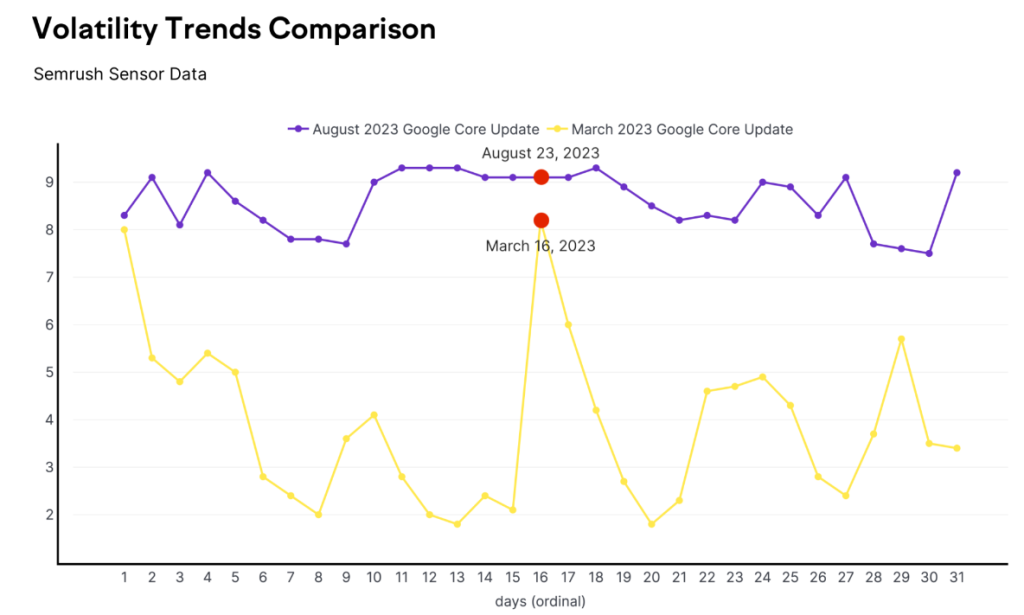
Helpful Content Update (September 2023)
On September 28, Google introduced the Helpful Content Update for September 2023. Focused on enhancing search engine results, this update particularly targets AI-generated content and the spread of low-quality or irrelevant information.
The update promotes valuable content and aims to reduce less useful material, with a global impact across all languages. Barry Schwartz notes that this update will significantly affect online resources in education, entertainment, retail, and technology.
Danny Sullivan, Google’s Public Liaison for Search, emphasized the company’s commitment to improving the authenticity of opinions and search result rankings. In a tweet, he said, “We’re not just making it easier to find genuine perspectives; we’re also refining how we rank results in Search, prioritizing content with unique expertise and experience.”
Google warns that sites with a high volume of irrelevant content may face ranking challenges. Removing such content could improve the ranking of other content on the same site.
Google offers guidelines to help content creators align with its objectives, encouraging the production of helpful, people-focused content. These guidelines include self-evaluation questions for site owners:
- Does the content provide original information, reporting, research, or analysis?
- Does the page title accurately summarize the content?
- Would this content be considered for citation in a printed magazine or book?
- Is the content mass-produced, or is it crafted by a limited number of skilled creators?
The observed volatility in recent times, particularly within SEO chatter and discussions in SEO forums, was quite significant. Many anticipated a substantial content update from Google in 2022, which, unfortunately, did not materialize. Our assertion is that this update had a more notable impact within the SEO industry niche, especially affecting websites specifically designed to attain high rankings in search engines. This impact contrasts with typical sites that take into account factors beyond search engines.
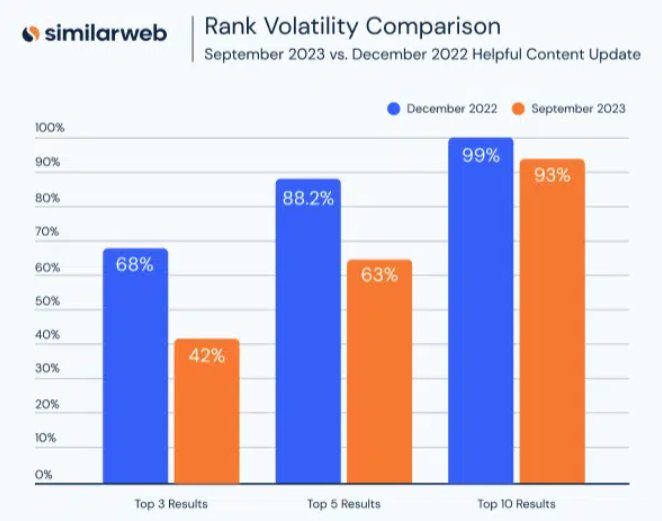
Core Update (October 2023)
The third core update of the year, the October 2023 Core Update, was active from October 5 to October 19.
Core updates represent major changes to Google’s search algorithms and infrastructure, which can lead to significant shifts in website rankings. It’s important to understand that these updates are not targeted at specific pages or sites.
Google’s aim with core updates is to continually refine the delivery of relevant and accurate search results. This process is akin to updating a list of the top 100 books in 2021, including new books that didn’t exist three years ago or reevaluating the rankings of others based on their current merits.
The impact of this update on your site may vary. A surge or decline in traffic can often be attributed to these algorithmic changes.
The focus of this update is on content quality. Google has raised its standards for content, rewarding sites that provide accurate, helpful, and expert-backed information, while those with superficial content may see a decline in rankings.
E-A-T (Expertise, Authoritativeness, and Trustworthiness) is now more crucial. Enhancing your site’s E-A-T is essential. Showcasing your team’s qualifications, building user trust, and earning backlinks from reputable sources are key strategies for success.
Measuring volatility in the latest update posed challenges, mainly due to its overlap with the October spam update. Despite this difficulty, several data providers strongly sensed the significant impact of the observed volatility.
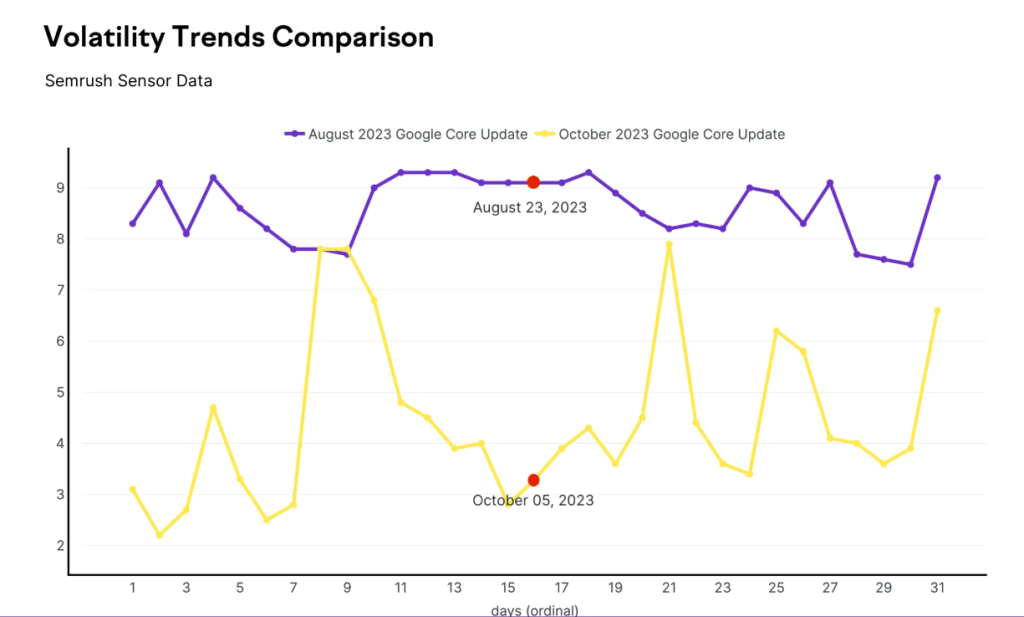
Spam Update (October 2023)
The October 2023 Spam Update, launched alongside the core update on October 4, aimed to strengthen Google’s spam detection systems. This update, completed around October 20, expanded its reach to multiple languages, including Turkish, Vietnamese, Indonesian, Hindi, Chinese, and more. Google’s official statement indicated that the update was designed to improve the effectiveness of their spam detectors and cover a wider range of languages and spam types.
Google targeted several types of spam, including:
- Cloaking: Presenting different content to users and search engines to manipulate SERPs.
- Doorways: Pages created to rank highly for specific search queries, often leading users to less useful intermediary pages.
- Scraped Content: Copying content from reputable sites without adding value.
- Spammy Auto-generated Content: Using algorithms to create content that lacks originality or value.
- Hidden Text and Links: Including content on a page to influence search engines, but not visible to users.
- Keyword Stuffing: Excessively using keywords to manipulate SERPs.
Businesses impacted by this update should review their practices to ensure they align with Google’s spam policies.
Data from providers signals that the volatility surpassed that of the October spam update, coinciding with the November reviews update.
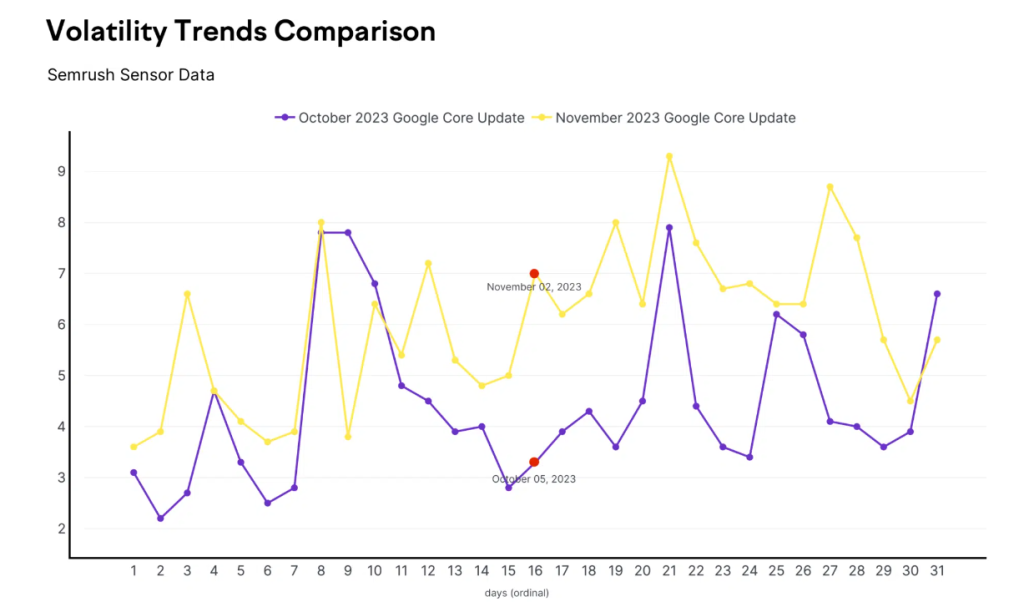
Core Update (November 2023)
On November 2, 2023, Google rolled out a core update aimed at enhancing the quality and reliability of search results. This algorithmic shift gives priority to factors such as content quality, user experience, and mobile friendliness.
The November 2023 Core Update notably emphasizes user experience and mobile friendliness. Google’s goal is to enhance user engagement in search results by considering website loading speed, mobile responsiveness, and ease of navigation. The update offers a more comprehensive approach to evaluating page experience, including aspects such as loading speed, mobile compatibility, and security features, to deliver a better and safer browsing experience.
This update highlights the significance of mobile-friendliness and overall user experience. Websites that provide a smooth, responsive, and mobile-optimized experience are likely to benefit from this update. Adapting to these evolving standards entails focusing on navigability and accessibility across different devices.
Moreover, Google has emphasized the importance of Backlinks and Expertise, Authoritativeness, and Trustworthiness (E-A-T) in its ranking algorithm. This update places a strong emphasis on E-A-T when assessing website quality and authenticity.
The goal is to prioritize content from credible and authoritative sources, ensuring that search results offer accurate information and contribute to a trustworthy online environment. High-quality backlinks from reputable sites remain critical as indicators of a website’s reliability.

Review Update (November 2023)
The November 2023 Review Update began on November 8, 2023, and concluded within two weeks. This update focuses on identifying well-crafted reviews that feature in-depth analysis and unique insights, especially those written by experts or enthusiasts.
The update evaluates content on a per-page basis, targeting articles, blog posts, or other standalone content that provides recommendations, opinions, or analysis. Site owners are advised to consult Google’s guidelines for creating high-quality reviews.
When creating content, it’s essential to:
- Demonstrate your expertise.
- Substantiate your claims with evidence.
- Explore the subject’s pros and cons in detail.
The objective is to equip users with comprehensive information, enabling them to make well-informed decisions based on a deep understanding of the subject. While improving your content can contribute to recovery over time, it’s one of several factors influencing content ranking.
We faced challenges in obtaining data to compare the volatility of this update with its predecessors. The issue emerged because of the overlap with the November core update, leading to data that was too tangled to neatly differentiate.
Other Google algorithm Changes, Updates or Modifications
- In May, Google shared details about its topic authority system, geared towards boosting the visibility of news content. It wasn’t a new algorithm, but rather a system that hadn’t been discussed before.
- Google rolled out an update, separate from content improvements, to spot valuable content that might have been overlooked. This could lead to a more personalized Google search experience.
- In November, Google made modifications to its local ranking algorithm, giving importance to the “openness signal” for non-navigational queries.
- From Oct. 5 to Oct. 31, Google faced a bug in its core update, impacting Discover-related traffic.
- In September, Google updated its language-matching algorithm. Google informed us: “Over the past few months, we’ve also released a series of updates to enhance our language matching systems, including the most recent update about two weeks ago.” Together, these updates should better align results with the language someone searches in while still allowing multilingual searchers the flexibility to obtain results in various languages.
- Google provided information on several ranking algorithms in their help documentation but noted that, although page experience isn’t a ranking system, it may still be used as a signal.
- On November 16, Google revised its search quality rater rules to emphasize user intent and whether search results meet user expectations.
- In March, Google updated its ranking updates page to enhance tracking.
Conclusion
Marketers, content creators, and SEO specialists must be vigilant in tracking Google’s periodic search algorithm updates. To maintain and enhance your Search Engine Results Page (SERP) rankings, it’s essential to stay informed about and adapt to these updates.
While pinpointing the exact causes of performance changes can be challenging due to Google’s partial opacity regarding its algorithm modifications, one consistent principle is clear: producing high-quality, user-centric content remains the most reliable strategy for successful search engine optimization.
FAQs
Why is staying updated on Google Search Algorithm updates important for SEO?
Staying informed about algorithm updates is crucial for SEO professionals to adjust their strategies accordingly. Google updates can significantly affect search rankings, user experience, and website visibility.
How can businesses adjust their SEO strategies to accommodate algorithm updates?
Businesses should focus on creating high-quality, relevant content, optimizing for mobile devices, and ensuring an excellent user experience. Keeping abreast of SEO best practices and swiftly adapting to algorithm changes is key to maintaining or enhancing search rankings.
Are there any tools available to track and analyze the impact of Google Search Algorithm updates on a website?
Yes, tools like Google Analytics, Google Search Console, and various third-party SEO tools can help monitor website performance and detect shifts in search results. These tools provide valuable insights to gauge the impact of algorithm updates.
What are the potential consequences of ignoring or neglecting Google Search Algorithm updates?
Ignoring algorithm updates can lead to decreased search rankings, reduced organic traffic, and lower online visibility. Staying informed and adjusting strategies accordingly is vital for sustaining a successful online presence.
